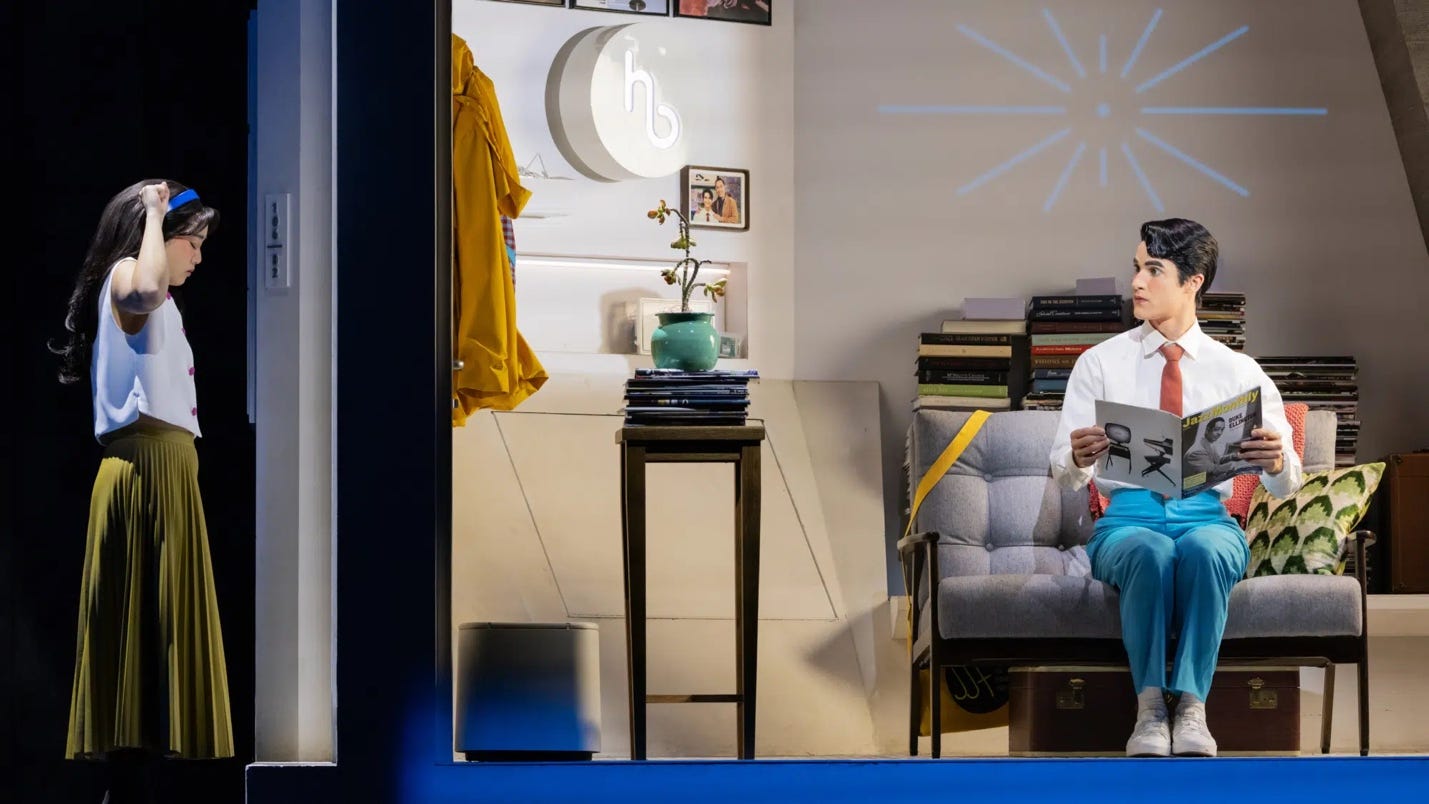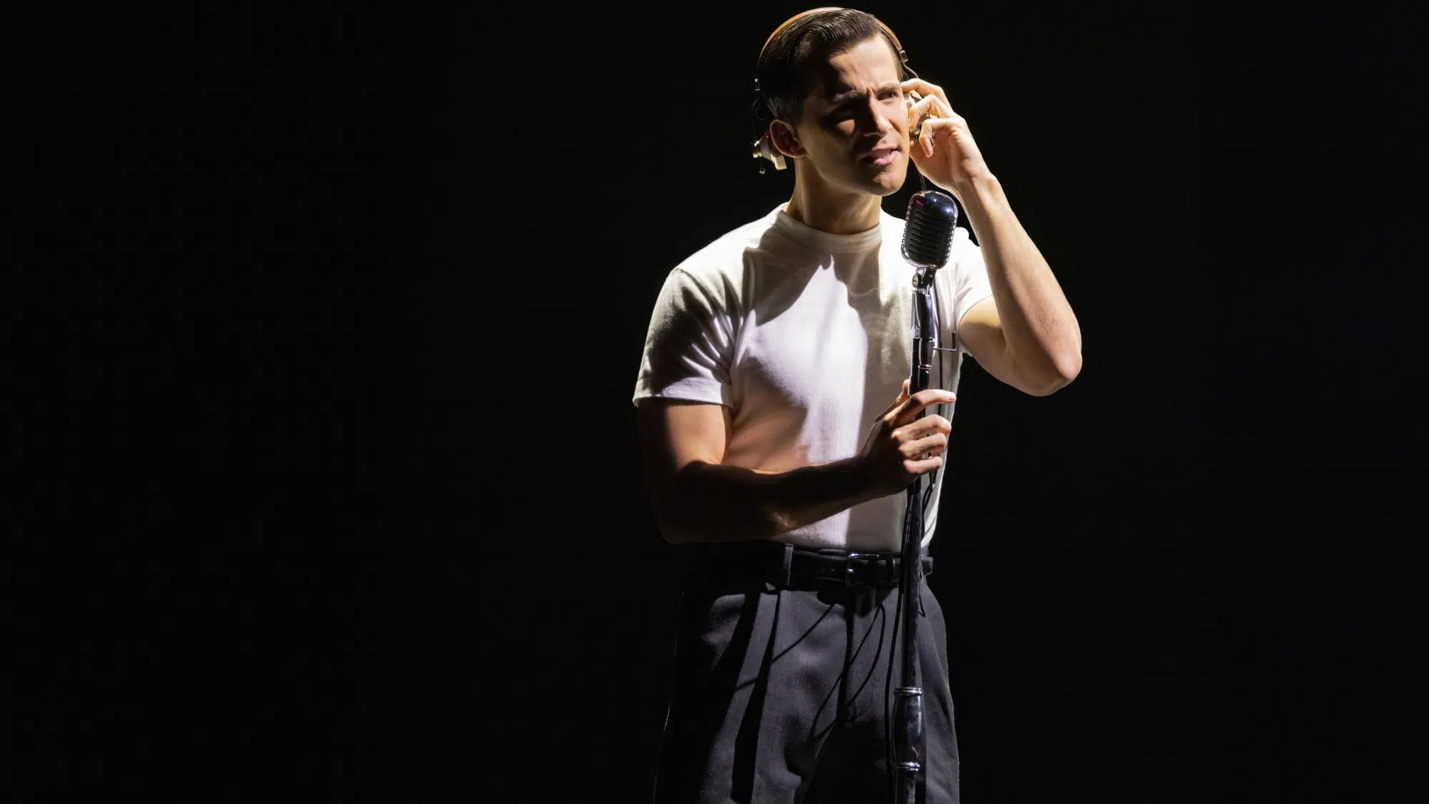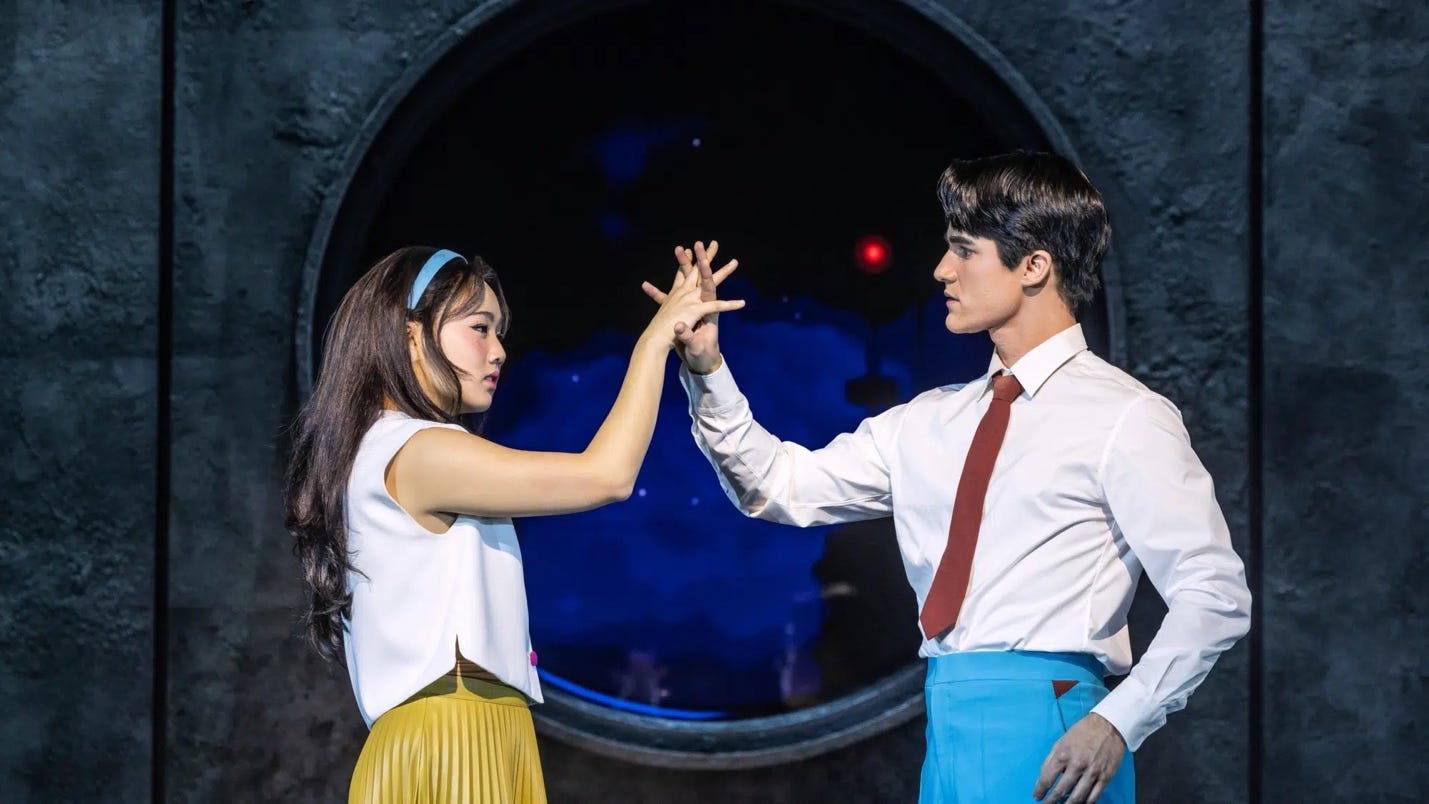NY Reviews: The enchanting musical “Maybe Happy Ending” asks: Could robots find love?
Plus a fun but over-stuffed portrait of televangelist "Tammy Faye"
Something totally original is happening at the Belasco Theatre. It’s “Maybe Happy Ending,” a delightful, moving, and thought-provoking musical about two retired robots who fall in love.
It's the near future in Seoul, Korea, and Oliver (Darren Criss) and Claire (Helen Shen, excellent in her Broadway debut) are "HelperBots"--human-appearing, highly intelligent robots--who have been discarded by their owners. But instead of being in a trash pile, they “live” in a large apartment building (Units 82 and 84 on the 106th floor). Right there, before anything’s happened, is an intriguing commentary about our relationship with technology. Like that old cell phone you keep in a drawer, we develop an attachment to our tech and can’t just throw it away. For HelperBots, this means housing them in an apartment building.
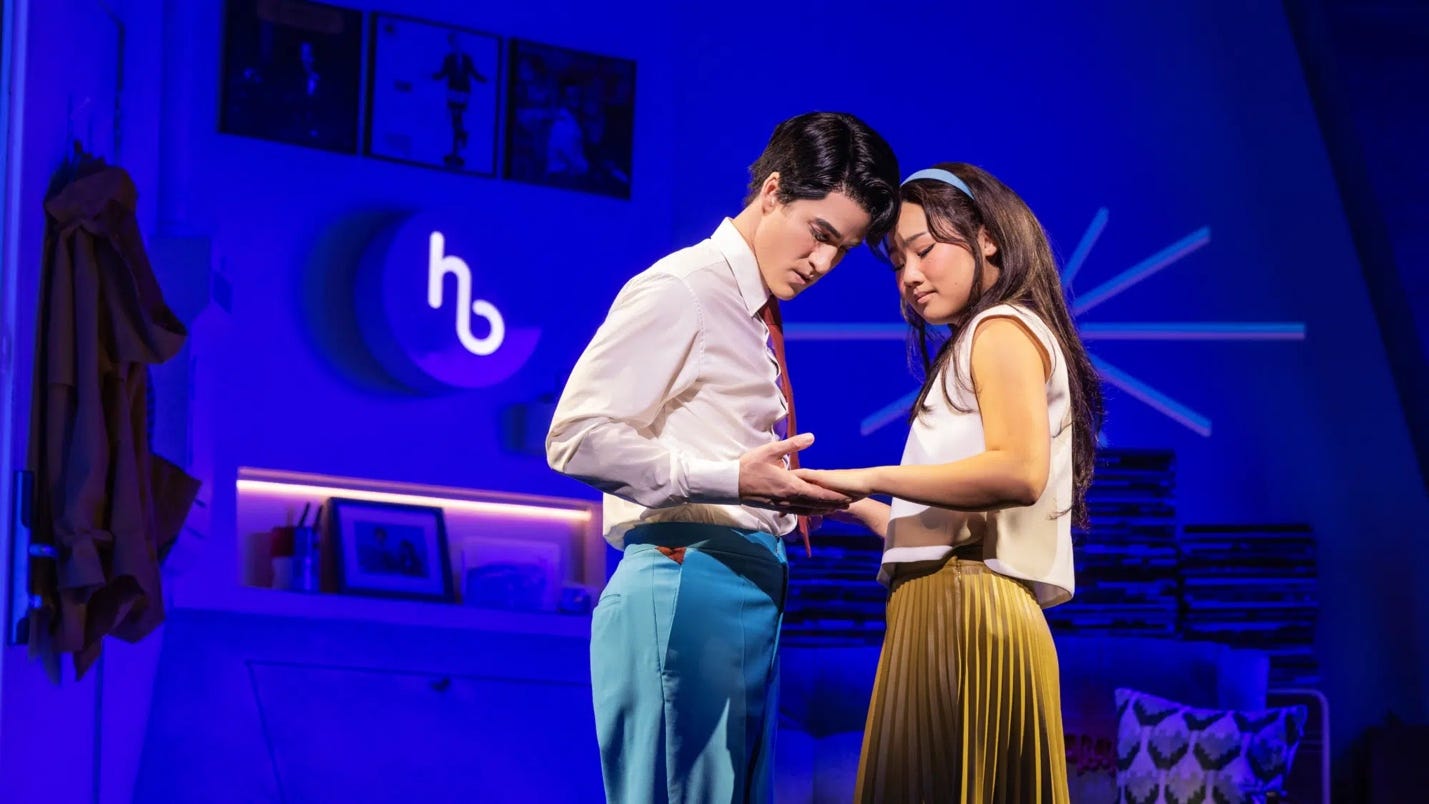
But this only occurred to me afterward as I pondered what I had seen. As I watched the show, I was totally taken in by the characters. Sure, they have a charger and one, Oliver, moves robotically and appears plastic (just-right makeup design by Suki Tsujimoto). But their desires, emotions, and interactions are utterly human. Oliver has been in the "Helperbot Yards" for a dozen years and still clings to hope that his previous owner will come back and pick him up again. An opening sequence reminded me of the one in the Disney film “Up” in the way it tells a whole story in just a few minutes: Oliver “wakes up” in his apartment every day, gets the mail, cleans, talks to his plant, and hopes to hear from his former owner James. He reads “Jazz Monthly” and listens to jazz records (a delightful detail, LPs being so at odds with the otherwise entirely digital world). He only ventures out to collect and recycle cans, so he can save enough coins to travel to his former owner. Projections signal that the years are flying by, and while Oliver maintains his chipper optimism, we see it for what it is.
And then the catalyzing event occurs: his neighbor across the hall, Claire, knocks on his door in search of a charger. (Hers is broken, and they are robots…no charger, no “life.”) She's a "Helperbot “5" and he's an older "3," which explains his greater stiffness and her looser, more human-like energy. We’ve known for years that actor Criss can sing and act; here, he shows off his physical comedy chops, making us truly believe he’s a stiff robot. Claire has seen some hard stuff: "You know you only last so long," she sings. She seems to be talking about herself as a robot who will eventually break down, but the line hit me as a profoundly human reckoning with mortality.
In a lovely sequence reminiscent of an old-school musical, complete with beautiful underscoring, Oliver begrudgingly allows her to use his charger each day. When she realizes his plan to travel back to his owner, she suggests they go together and make a stop to see that town’s famous fireflies. And they're off! Along the way they'll learn about their pasts, have new experiences together, and maybe find love. It’s charming throughout, full of surprises and warmth.
The fictional jazz singer Gil Brentley (Dez Duron) appears occasionally to perform songs that accompany the main characters’ actions, placing this futuristic story within a grand jazz tradition. It’s a lovely touch, and Duron croons like the best of ‘em. I love a choice like this that can’t be fully explained, has a bit of mystery even, but just works.
Broadway newcomers Will Aronson and Hue Park have written a score befitting of a Golden Age Broadway musical—rich, tuneful, and full of soaring melody—that somehow also feels totally contemporary. The dialogue they write is snappy, quite funny, and keeps the plot moving forward. The show arrives in Broadway after a run in Atlanta and, before that, a Korean-language version in Seoul. This is an unusual path for a Broadway musical, and it’s refreshing to see a story that takes place in South Korea and lifts up that country’s culture and natural wonders (those fireflies!) in an organic, non-exoticizing way.

A bento box of a set from designer Dane Laffrey consists of several "rooms" behind black panels that slide up and down and side to side to reveal just a section of stage at a time. (It also reminded me of a computer’s windows and swiping on your phone to open a new app.) Lights around the edges of these rooms fit with the futuristic vibe—they perfectly frame the box of space you are seeing at that moment. The HelperBot Yards apartments are appointed with perfect details for a futuristic building: concrete columns, exposed piping, and big round windows.
The set design contains many more delights and surprises which I won’t spoil here. While the show has only four on-stage actors (plus two others portrayed in film), it feels much bigger than that because of this ever-changing set. Video from designer George Reeve portray the filmed memories of the robots, helping us understand the experiences they had with their owners—a clever way to provide exposition. But the best use of video and lighting (from Ben Stanton) comes when the characters finally see the fireflies—a moment of awe that inspires even robots, who are presumably incapable of such a feeling.
This is the kind of musical that wriggles its way into your brain and stays put. Is it primarily about our own mortality, using machines to help us understand ourselves better? Is it about how ever-smarter technology that can learn from its users will eventually develop human emotions and the capacity to love? And if they do, will it be unethical or immoral to discard them when they are obsolete? Or can this be enjoyed as simply a beautiful love story whose protagonists happen to be robots. The answer is, “Yes.” Any way you look at it, “Maybe Happy Ending” makes for excellent theatre.
Open run at Broadway’s Belasco Theatre.
Review: Televangelist Tammy Faye is the subject of a fun but over-stuffed bio-musical
“Tammy Faye,” a big budget bio-musical about the televangelist and campy queer favorite, opened on Broadway last week to bad reviews and promptly posted a closing notice.
Its failure is not because of the cast, who do their absolute best with the material. Nor is it the goofy period costumes from Katrina Lindsay or the over-the-top set from Bunny Christine, featuring a massive white wall of square television screens used in myriad ways. Neither is it the score from Elton John, whose gospel-inflected rock songs sound great as performed by the strong ensemble and 18-person orchestra under Tom Deering’s supervision and Nick Lidster’s Sound Design. All this bigness is just right for the massive, 1,600-seat Palace Theatre, which has been souped up and looks gorgeous.
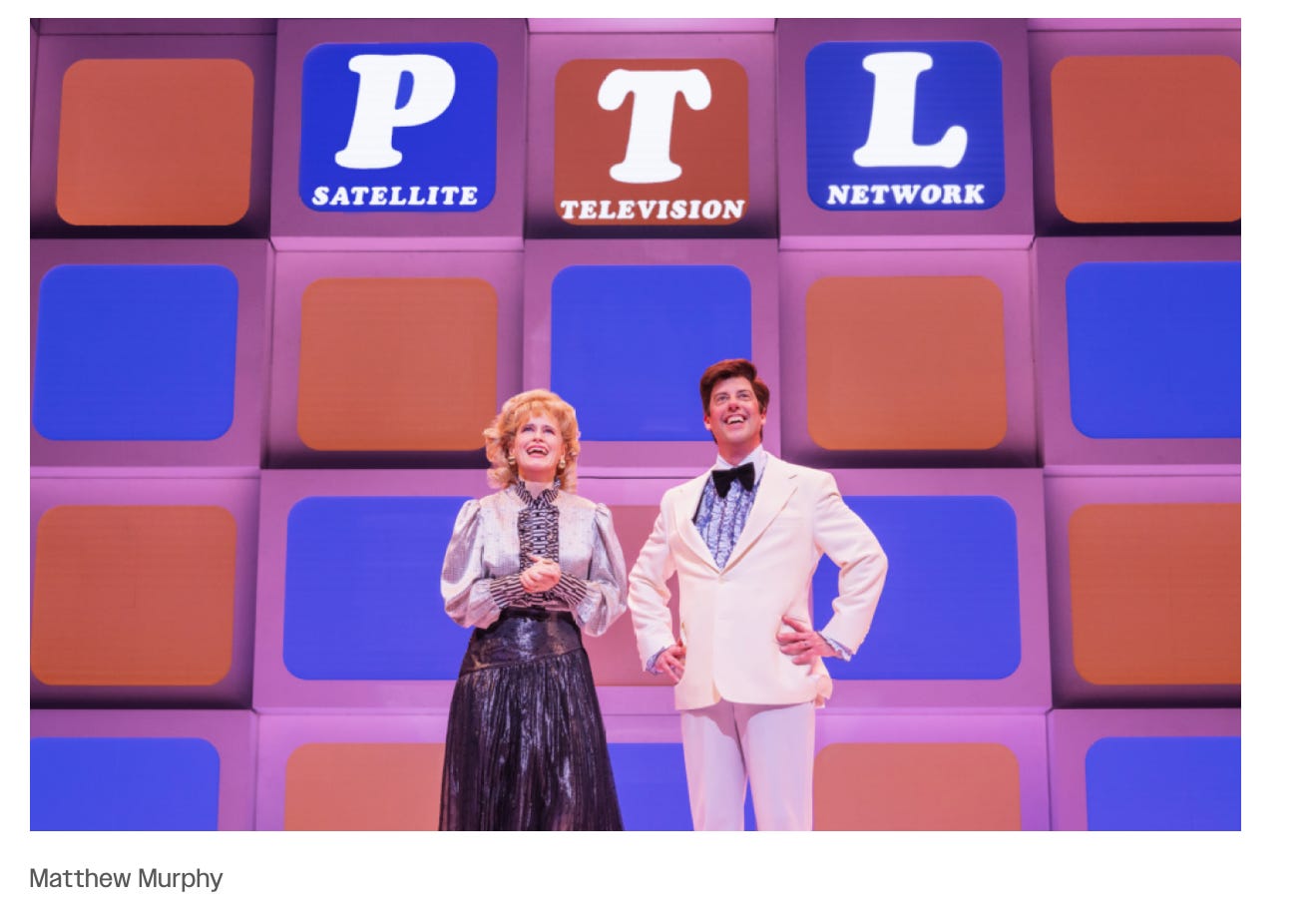
The biggest issue with the show is the book, from British playwright James Graham, and lyrics, from pop artist Jake Shears. While the dialogue intermittently succeeds and lands some good jokes, the show isn’t quite sure what it wants to be: a celebration of a woman beloved for her support of gays—famously hosting a man living with HIV in 1985 on her show when that was unheard of—never mind her complicated legacy? An earnest bio-musical with a clear heroine who withstood the failings of the men around her? Or a nuanced portrait of a woman in all her strengths and flaws? The show seems to be trying for all three and the result is messy.
Even so, for most of the first act, it proceeds at a steady clip, charting Faye (Katie Brayben, who won an Olivier for the role in London) and husband Jim Bakker’s (the always-good Christian Borle) rise as televangelists, starting with their meeting at a Billy Graham-convened preachers’ convention. It’s the dawn of satellite television and televangelism, and they dream of a TV ministry that is upbeat and positive as opposed to the fire-and-brimstone approach practiced by their contemporaries, especially Jerry Falwell (Michael Cerveris, solid), clunkily portrayed as the villain. I knew very little about Bakker and Faye going in, so was astounded by some of their story’s details. For one, that they founded a religious “theme park” financed with debt their followers were asked to help pay back (!).
After this assured start, the show starts weaving in a lot of threads: the couple’s over-spending and going into debt, Baker’s infidelity and possible homosexuality, Falwell and his effort to influence Reagan to infuse religion in politics, and other televangelists’ reactions to the couple. Oh yes, and the pope and Colonel Sanders show up, too. It’s too much. None of these plots are developed satisfactorily in the second act, which is where the show really loses its way, with storytelling gaps that made me throw up my hands and try to just enjoy the humor and musical numbers. Crafting narrative art around real people is never easy. Life doesn’t usually fit into a clear arc and the challenge facing writers of a bio-musical is which biographical plot points to include, what conflicts to emphasize, and what conclusion to come to. The choices here don’t add up to a coherent tale.
The other weak spot of the show is Shears’s lyrics, which hold back the songs from doing the dramatic work required of them in a musical. He’s a gifted musician, with many excellent pop songs on his own and with his group the “Scissor Sisters.” But pop lyrics usually don’t work for the storytelling demands of theatre. Only occasionally do they land, like in the early number “He’s Inside of Me,” ostensibly about God, but full of double entendre that was truly funny.
Queer storylines and sensibilities are having a moment on New York stages: from the out-of-nowhere smash success of “Oh, Mary” (which just recouped its investment), to this summer’s must-see musical “Cats: The Jellicle Ball,” to the years-long run off Broadway of the very funny “Titanique,” and most recently, “Death Becomes Her,” which last week opened to strong reviews and predictions of a long run. These prove that the gays—and everyone who has fallen in love with queer culture—will show up for high-quality entertainment that speaks directly to them. The mostly queer creative team behind “Tammy Faye” seems to have tried to position the show in line with these, believing that Faye’s camp status and queer history would drive ticket sales. Alas, they have been very weak and the show will close after 53 performances.
I always find it sad when a play closes so quickly. “Tammy Faye” is a Big Broadway Musical in every sense, and all that money, all that work, all that effort by the performers…it just heightens the disappointment that the material isn’t strong enough to succeed. I really and truly want every show to be great, to find its audience, to succeed! Alas, this one did not.
Playing through December 8 at the Palace Theatre.




